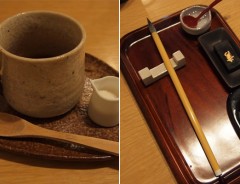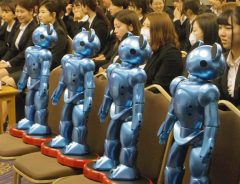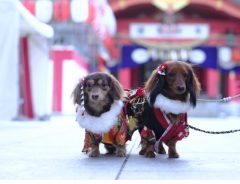- Tags:
- AI / Android / Buddhism / Robot / spirituality
Related Article
-

Buddha’s Cafe: Enlightening Our Minds Over A Cup Of Coffee
-

“Gensōkyō System” adds special effects to cosplay shoots via projection mapping & AI
-

Now You Can Experience Traditional Japanese Art in Mixed Reality at Historic Kyoto Temple[PR]
-

With Help from Robots, Nursery Teachers Have More Time to Focus on Children
-

Japan’s Top Five Virtual Humans
-

Japanese Shichi Go San Ceremony for Children Can Now be Performed for Pets Too



Japan is a wondrous blend of old and new—a high-tech and simultaneously anachronistic society. In the middle of bustling metropolitan centers lie peaceful shrines and temples offering businesspeople passing serenity. Indeed, Japanese spirituality is deeply woven into the fabric of this high-pace, 24/7 society. And it shows.
The basis of this intersection is likely ancestor worship. Veneration of the dead, with origins in Chinese Confucianism, is systematic in Japan. Most Japanese homes contain a butsudan, an in-house altar to ancestors, where offerings are laid, and daily prayers take place. During the summer, residents believe that deceased family members return home during the seven-day Obon festival.
In Japan, the tradition of ancestry worship fortifies customs while preserving ancient culture. For male heirs to be deified, they must fulfill several obligations. These heads of the family must marry and maintain the familial line. With family structures rigidly defined, a clan's role in society is also well-scripted. Such demarcated roles are part and parcel of Japanese culture. They likely help preserve the culture throughout generations.
Nevertheless, as residents move to densely crowded urban centers, rural areas are waning in their absence. In particularly hard-hit areas, rural-flight is affecting businesses and resources. Temples and shrines are alas residents move to densely crowded urban centers, rural areas are waning in their absence. In particularly hard-hit areas, rural-flight is affecting businesses and resources. Tempso feeling the pressure, as donations drop, and monks are forced to hang-up their robes. With a reputation as a technology innovator, it's no surprise that Japan is looking to high-tech solutions to help preserve its religious customs.
Android Buddha
An Osaka robotics team has developed an android Bodhisattva for Kodaiji temple in Kyoto. The 2-meter tall robot, which cost about $1 million, can recite prayers while making basic gestures. Known as Mindar, temple-goers consider the humanoid monk an embodiment of Avalokitesvara, the Buddhist goddess of mercy.
The robot priest was commissioned by Tensho Goto, the head abbot of Kodaiji temple. According to Goto, practitioners are accustomed to Buddhist statues. Yet, the monk wanted a figure that guests could interact with and ask questions. Although the android can currently only recite prayers, future updates will program the robot with interactive AI technology.
Despite her exposed inner-workings and obtuse presence, Mindar has been a hit with the temple-going public. Japan is a leader in robotics, and automatons are increasingly entering people’s lives. Residents are growing comfortable with the technology, leading many worshippers to claim they feel comfortable with Mindar. In developing the bot, Goto admits there are many things human priests cannot do. Perhaps automatons can help fill the void.
Clova Speakers
Japanese families are primarily Buddhist or Shinto. Regardless, many struggle to find the time for temple visits while balancing busy home and work lives. As an unfortunate side-effect, remotely located temples are increasingly going-under.
Through tough times, Clova speakers and the Yorisou monk service may help bridge the gap. Owners of LINE Clova speakers, an Alexa-like device, simply tell the smart-speaker to contact a monk, and the Yorisou Obousan service takes over. Users identify their mood, and the AI-powered device chooses a short-talk by a monk.
For most, the service is free-of-charge. Consumers in need of personalized visits can receive such for about 35,000 JPY ($270). As this is a reduced price, affiliated monks have noticed a surge in in-person visit requests.
Online Fortune Telling
Palm readers are a common sight in Japan. In half-deserted shopping arcades, the mystics can often be seen after hours sitting at makeshift desks in front of shuttered stores. For a small fee, they can tell you your future by reading the lines in the palm of your hand.
Although it may seem like superstition, many spiritually-inclined residents seek out fortune tellers, clairvoyants, and other sorts of mystic gurus. Particularly well-known practitioners amass cult-like followings or a notable online presence while leading posh lifestyles.
Camille VoIP is a recent start-up. The online shop hosts numerous card-readers, horoscope-readers, and clairvoyants. For a small fee, customers can channel loved ones or receive psychic healing in one-on-one chats via VoIP, video, or chat. Meetings run about 125-230 JPY/minute depending on the service
We at grape Japan were intrigued by the business. Recently, we caught up with the card-reader Lolo. You can check out our interview here.
Charm Vending Machines
Although known as the Land of the Rising Sun, Japan is more identifiable by something much banaler: vending machines. If you've visited the country, you know what I mean. They are in every park and every street consuming who knows how much electricity annually.
They offer a wide variety of items other than beverages. Some feature soup, others ice cream. Adult movies and other erotica can be purchased from machines in seedier areas. And who knows what else.
It shouldn't be surprising that religious charms, known as omamori, can also be purchased. In Japan, amulets have numerous effects. There are the garden-type varieties for love, success, and money. But they get more precise in their purpose. Some protect users from traffic accidents while others claim to help wearers become beautiful or safeguard pets.
Depending on the type of charm, they typically range from about 500-1000 JPY. A great way to get your spirituality on the go.